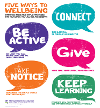Overseas conflict
There are a number of conflicts overseas which may be feeling close to home for children and families who have strong connections with the countries involved.
'The most important thing for a child is to feel safe and secure. If that has been taken away from the child, it is up to the parents and adults to bring them back to being children again.' (Baron, 2004 for UNICEF)
A few key principles for adults to remember when supporting children and young people:
General
- Be sensitive/culturally competent. There are often multiple viewpoints about the conflict - it may be helpful to explore these from trusted media sources such as the BBC but when talking to distressed families or children our role is to listen and try to understand what is going on for them.
- Aim to keep people, rather than politics, at the heart of any discussions or comments; for example, compassion for all those affected.
- Try not to make assumptions about the views of others, again be mindful to listen rather than talk.
- Be conscious that when making statements prominent figures represent their own views and do not necessarily speak for everyone.
- Talk to young people when they are part of a safe, supportive group; for example, tutor time, class groups or smaller groups and avoid talks and/or discussions in large assemblies.
- Find out what they already know.
- Listen carefully to what is being discussed and notice any individuals that may need further support (often having an additional adult to observe can be helpful).
- Listen for misunderstandings and rumours.
- Acknowledge confusion or what is unknown.
- If appropriate share factual information about the war/conflict but be alert and sensitive to different points of view (refer to 'Windows on the World' below). Use this as an opportunity to discuss reliable sources of information and to dispel incorrect information, rumours and conspiracy theories.
- Identify any particular concerns or worries that they have - validate and normalise their feelings and help them identify ways to cope with their mix of emotions. Keep a focus upon what is within their control and their wellbeing (for example, they can fundraise for a specific charity).
- Encourage a thoughtful approach to the media/social media. Avoid over exposure and repetitive media coverage. Graphic images and interviews with people directly affected can be very unsettling.
- Help children and young people to understand the 'bigger picture' - there are many countries at war across the world with significant numbers of refugees for different reasons; discuss how they/your school might be able to help others.
- Help children and young people to shape their own beliefs. Revisit school strengths and core values and how these relate to the current situation.
- Ask children and young people how they might want to support those affected within their community and beyond (for example, continuing to treat people with respect and compassion, collecting donations, writing to their MP, supporting specific charities etc).
- Remind children and young people of the good things that are happening around the world so that they can develop a balanced view of the world around them; sharing a daily good news story might be a start.
Windows on the world
The way we make sense of the world, ourselves and everyone in it comes from our windows on the world (our 'Frame of Reference' Jacqui & Aaron Schiff). Our window is unique to us and shaped by a whole host of factors including:
- childhood
- family
- gender
- education
- health
- relationships
- socio-economics
- nationality
- culture
- religion
- sexuality
- achievements
- loss
- values
- injustice
- trauma
The families and young people in our schools will have their own windows on the world perhaps leading to different views about the conflict.
Wellbeing
We often talk about focusing upon wellbeing, you can find a few ideas below.
Whole school approaches
Following the pandemic, there was work on whole school recovery and drawing on these five key principles could be useful for some schools as at the heart of this model are values, relationships, safety and wellbeing.

- It might be a good time to refocus on the school's core values and explore these in assemblies or in classes.
- Strong, trusting relationships are likely to be at the heart of your school. Celebrate these and be mindful of students who are particularly vulnerable and strengthen key relationships with staff and other students. If the relationships are strong, then the young people are more likely to feel safe and secure.
- Keeping the school as normal as possible usually makes it a safe haven for students and their families.
- Acknowledge and normalise their feelings and experiences.
- Look after yourselves and each other in small ways.

Individual approaches

Building helpful habits:
- exercise
- diet
- sleep
- social connections
- hobbies




